|
|
|
Sort Order |
|
|
|
Items / Page
|
|
|
|
|
|
|
| Srl | Item |
| 1 |
ID:
102470
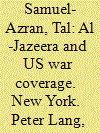

|
|
|
|
|
| Publication |
New York, Peter Lang, 2010.
|
| Description |
xi, 161p.
|
| Standard Number |
9781433108655, hbk
|
|
|
|
|
|
|
|
|
|
|
|
Copies: C:1/I:0,R:0,Q:0
Circulation
| Accession# | Call# | Current Location | Status | Policy | Location |
| 055848 | 070.433356/SAM 055848 | Main | On Shelf | General | |
|
|
|
|
| 2 |
ID:
095213
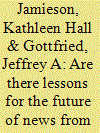

|
|
|
| 3 |
ID:
144081
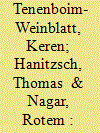

|
|
|
|
|
| Summary/Abstract |
This article presents a general framework for deconstructing and classifying conflict news narratives. This framework, based on a nuanced and contextual approach to analyzing media representations of conflict actors and events, addresses some of the weaknesses of existing classification schemes, focusing in particular on the dualistic approach of the peace journalism model. Using quantitative content analysis, the proposed framework is then applied to the journalistic coverage in the Israeli media of three Middle-Eastern conflicts: the Israeli–Palestinian conflict, the conflict surrounding Iran's nuclear program, and the Syrian civil war. The coverage is examined in three leading news outlets – Haaretz, Israel Hayom, and Ynet – over a six-month period. Based on hierarchical cluster analysis, the article identifies four characteristic types of narratives in the examined coverage. These include two journalistic narratives of violence: one inward-looking, ethnocentric narrative, and one outward-looking narrative focusing on outgroup actors and victims; and two political-diplomatic narratives: one interactional, and one outward-looking. In addition to highlighting different constellations of points of view and conflict measures in news stories, the identified clusters also challenge several assumptions underlying existing models, such as the postulated alignment between elite/official actors and violence frames
|
|
|
|
|
|
|
|
|
|
|
|
|
|
|
|
| 4 |
ID:
095219
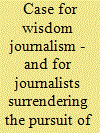

|
|
|
| 5 |
ID:
126802
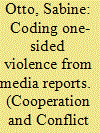

|
|
|
|
|
| Publication |
2013.
|
| Summary/Abstract |
Event datasets on political violence, which are comprised of coded collected news reports, have enjoyed a renaissance within the academic community. The inclusion of civilian fatalities within these datasets is a promising and welcomed advancement regarding the availability of data on one-sided violence. However, these datasets are often criticised due to their heavy reliance on media records, which may be tainted by biases. So far, little attention has been paid to the specific problems that arise in the coding procedure with respect to one-sided violence. This article addresses such difficulties by discussing particular challenges presented by media biases and by providing empirical evidence from coding one-sided violence. Furthermore, solutions and strategies are offered to the issues that could affect the coding process, including increased transparency, definition-adaptation, and the use of appropriate statistical models.
|
|
|
|
|
|
|
|
|
|
|
|
|
|
|
|
| 6 |
ID:
095225
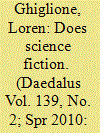

|
|
|
| 7 |
ID:
100885


|
|
|
| 8 |
ID:
178632
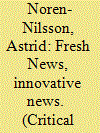

|
|
|
|
|
| Summary/Abstract |
This article seeks to advance understanding of how the new logics of an expanding digital media system can be mobilized in the service of authoritarianism, by tracing how an online news platform support the legal and discursive production of hegemonic authoritarianism in Cambodia. A state crackdown on independent media has been accompanied by the rise of private digital news outlet Fresh News, which has played a singular role in enabling, legitimizing, and seeking to craft support for Cambodia’s recent shift from competitive to hegemonic authoritarianism. Fresh News represents an authoritarian innovation which can be broken down into three main components: articulating a government-aligned definition of democracy which celebrates strongman rule and rejects liberal democracy; supporting an ongoing judicialization of Cambodian mega-politics; and disseminating a “fake news” discourse which seeks to achieve an epistemic shift. The ambiguous status of Fresh News as a private though overtly state-sanctioned enterprise is a key aspect of these authoritarian innovations, as it popularizes Cambodia’s authoritarian turn from the vantage point of an elusive distance from the state.
|
|
|
|
|
|
|
|
|
|
|
|
|
|
|
|
| 9 |
ID:
169100


|
|
|
|
|
| Summary/Abstract |
Commenters often criticize the mass media for providing audiences a narrow and inaccurate representation of U.S. military veterans. This study examined the claim by researching how regional news publications in the 50 states represented veterans on Twitter. A quantitative content analysis documented the presence or absence of characteristics in 1,460 tweets that employed the terms veteran or veterans. Data were examined using cluster analysis. Three frames emerged. The most prevalent frame, labeled charity, highlighted instances in which veterans received assistance from charitable organizations and others. The second frame, hero, contained references to honor, World War II, and content that would elicit pride from audience members. The third frame, victim, highlighted the mistreatment of veterans by the military and/or society, mental health issues, politics, and the Gulf War. Results suggest U.S. news consumers are provided a narrow representation of what it means to be a veteran.
|
|
|
|
|
|
|
|
|
|
|
|
|
|
|
|
| 10 |
ID:
118992
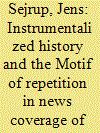

|
|
|
|
|
| Publication |
2012.
|
| Summary/Abstract |
Examining the coverage in seven major Japanese and Taiwanese daily newspapers of a selection of events involving both societies in the first decade of the twenty-first century, this paper investigates the phenomenon of rhetorical instrumentalization of the past for present ideological purposes. The concerns of this study are the processes of dehistorization in Japanese and Taiwanese news and public debate, and through a critical thematic reading of the sources I argue that a motif of Taiwanese repetition and imitation of Japan runs through all the studied cases as a basic narrative formula.
|
|
|
|
|
|
|
|
|
|
|
|
|
|
|
|
| 11 |
ID:
095223


|
|
|
| 12 |
ID:
130728
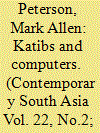

|
|
|
|
|
| Publication |
2014.
|
| Summary/Abstract |
In 1993, the prognosis for Urdu newspapers in north India was dismal. The readership was aging and dwindling as the new generation learned Hindi in Devanagiri script. Urdu calligraphers (katibs) were not passing their skills on to a new generation and writers skilled in Urdu were becoming increasingly hard to find. Fifteen years later, Delhi is home to a prosperous and expanding Urdu press. The number of newspapers had tripled, circulations were often higher than they had been in the past, profits were up and the atmosphere at Delhi's major Urdu newspapers was upbeat. A large part of the explanation lies in the intersection of language ideologies and new writing technologies. On the one hand, Urdu indexes crucial politically urgent populations, leading to a renewed interest in it from many sectors. On the other hand, new more flexible technologies allowed the retiring katibs to be replaced by computer typesetting that strongly resembles north Indian calligraphic styles and new software allows an entire daily newspaper to be assembled and sent to press using a single laptop. Drawing on ethnographic fieldwork in 1993 and 2008 at some of New Delhi's Urdu dailies and interviews with several editors, this article describes the mutual influences of Urdu language ideologies about Muslim identity and technological innovation in the revival of the Urdu daily.
|
|
|
|
|
|
|
|
|
|
|
|
|
|
|
|
| 13 |
ID:
095212
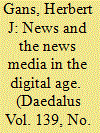

|
|
|
| 14 |
ID:
100886


|
|
|
| 15 |
ID:
100884


|
|
|
| 16 |
ID:
095221


|
|
|
| 17 |
ID:
131902
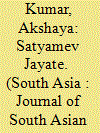

|
|
|
|
|
| Publication |
2014.
|
| Summary/Abstract |
Avatar
Film Star
Political Surplus
Truth
Entertainment
News
Crime
Cultural Economy
Moral Authority
Political Authority
Aamir Khan
Narrative Ingenuity
Politics
Social Changes
Trope
Social System
Social Reforms
|
|
|
|
|
|
|
|
|
|
|
|
|
|
|
|
| 18 |
ID:
186517
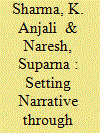

|
|
|
| 19 |
ID:
190785
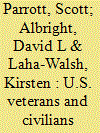

|
|
|
|
|
| Summary/Abstract |
The news media often portray military veterans in stereotypical ways, providing audiences narrow representations in which veterans are traumatized heroes. What happens when a veteran sees these storylines and assumes they affect how the public thinks about veterans? This question informs this study, which used a two-prong approach (online, telephone) to survey 1,047 American adults about news media and veterans. Respondents, including veterans and civilians, were asked to recall news stories about veterans, assess the quality of news coverage of veterans, and offer opinions concerning whether news coverage affects themselves and other people. When respondents could recall a news story about veterans, they described stereotypical stories related to victimization/harm, heroism, charity/social support, mental illness, and violence. Respondents, both civilian and veteran, described news coverage as mediocre and felt the news affects other people more than themselves.
|
|
|
|
|
|
|
|
|
|
|
|
|
|
|
|
| 20 |
ID:
186340
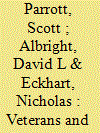

|
|
|
|
|
| Summary/Abstract |
The mass media are an important source of information concerning military service personnel and veterans. Veterans, veterans organizations, and others have criticized the mass media for providing the public shallow representations of veterans and military service in which veterans are heroes traumatized mentally and/or physically by their service. Despite the concern, scant research has empirically examined how exposure to such content affects public perceptions of veterans. Using an experiment, this study examined how exposure to news stories of military veterans informed thoughts, attitudes, and support intentions toward veterans. Results suggest short, one-time exposure to stereotypical news stories can lead readers to perceive an increased likelihood veterans will experience post-traumatic stress disorder and, in turn, feel less desire to be socially close with veterans. However, exposure to a story that challenges stereotypical representations of veterans appears to mitigate the effect. In addition, news exposure can influence support intentions related to veterans.
|
|
|
|
|
|
|
|
|
|
|
|
|
|
|
|
|
|
|
|
|